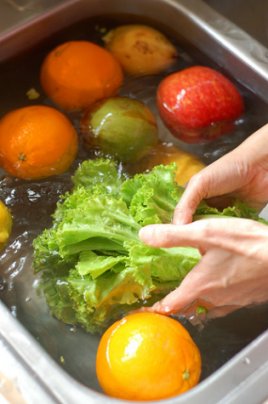
Clean Food. What does it mean? If you are literal it might promise a dirt-free meal. In that case, I prepare some of the cleanest food you will ever eat. I spray my organic apples with organic produce cleanser. I rinse my leafy greens twice in warm water and thrice in cold. Same with canned beans. In pinch, when I'm without my organic produce cleanser, I might wash the outside of cucumber with soap before peeling it, like a Prep Chef with O.C.D. Why? As a city dwelling mother of two (and one child with food allergies) if I am going to go to all the effort of purchasing and carrying bags of healthy foods to feed my family, I'm going to avoid the irony of contracting E-Coli from overpriced baby spinach. What a waste! I am far too Reluctant of a Foodie to take that chance.
On another clean note, due to my son's food allergies, I've learned to scrutinize my food choices and labels and have reason to be genuinely concerned with the state of packaged goods. I view food "contamination" in a unique fashion since, for example, nut particulates and unaccountable sesame seeds are the equivalent of a sprinkling of arsenic, nay a soupcon of lead in my son's mouth.
Now if I have a thing about clean food then it seem I'm not alone. Lately the phrase "clean food" has been bantered about with ease and frequency in my social circles. First, it was my friend Jennifer. Like many of my friends, Jennifer is a bit of a Foodie. She drives into Queens for blood pudding when hankering for a "Nice, traditional winter breakfast" and she enrolls in culinary classes called "Summer Grilling: From Flatbreads to Dessert Fruit."
A few weeks ago, while we were making dinner plans, Jennifer urged me over the phone, "Let's meet at that new Italian restaurant on 77th Street. I tried it and it's good. Good clean food." Then she repeated, "Really clean."
I was intrigued. Who wouldn't want to eat this clean food she speaks of? How could I refuse? Imagine: "No thank you Jennifer! I prefer grimy food!"
Subsequently, our dinner was quite tasty. My arugula salad wasn't limp. My scallops tasted like scallops, which is all I ever ask of them. My meal wasn't salty or under-seasoned or well, dirty. But it wasn't remarkable. I was confused. And rather than press my bother my good friend for her definition of "clean food" the next day, I researched it myself.
My question dates back to the winter of 1996 issue of The Trends Journal, in which the director of the Trends Research Institute in Rhinebeck, N.Y., described the clean-food diet as "a new standard for health and reliability." The keys according to Mr. Celente clean foods are "foods free of artificial preservatives, coloring, irradiation, synthetic pesticides, fungicides, ripening agents, fumigants, drug residues and growth hormones" and those that are "processed, packaged, transported and stored to retain maximum nutritional value."
Again, I had no idea if my previous night's meal came close to such standard. So I read on. Since 1996 definitions of "clean food" have varied from - "As close to the earth as possible" to "If it wasn't available to a caveman." Some clean eaters reject sugar, salt and processing and others eschew entire food groups, like dairy. Chefs allude to "clean flavors" when using Asian ingredients like rice wine and clear broths. And in September 2009 a book entitled "Clean Food" by Terry Walters was published as "An encouraging, easy-to-understand guide to eating closer to the source and benefiting from the nutritional profile of the freshest, in-season, locally grown ingredients."
Then a few days after dinner with Louise, as clean food ambiguities flitted about my head (what about locally produced buffalo mozzarella cheese from a earth grazing post-historic mammal?) I arrived early to a cocktail party. While I was helping the hostess set out the buffet table she gestured, "This was all made by in my kitchen by my incredibly talented culinary student. We live so close, I hired her to come twice a week and freeze batches of her cooking for family means. That way we can still eat clean, the way we were eating when we lived in Italy a few years ago. It was so hard to leave that."
Food was cleaner in Italy? France too? Is the food cleaner in all of Europe or just in select countries? I wondered throughout the evening.
"What do you think it means?" I demanded of my husband in the taxi home. But he was drowsy from ingesting too many wild mushroom-stuffed phyllo and in no mood to spar about food trends. Now, over a month after that party, despite continued questioning about the subjective and contradictory nature of "clean food," I have come no closer to an answer. Until I do, my zucchinis will be squeaking before meeting their fate in my frying pan.